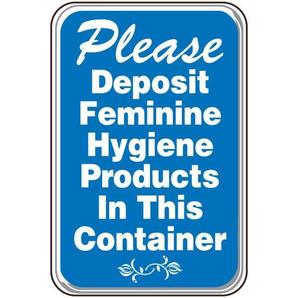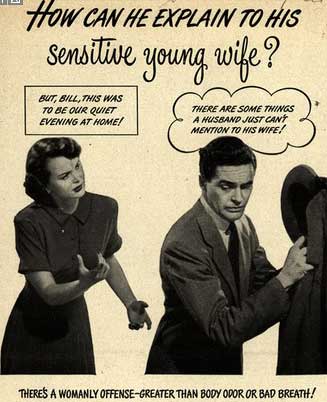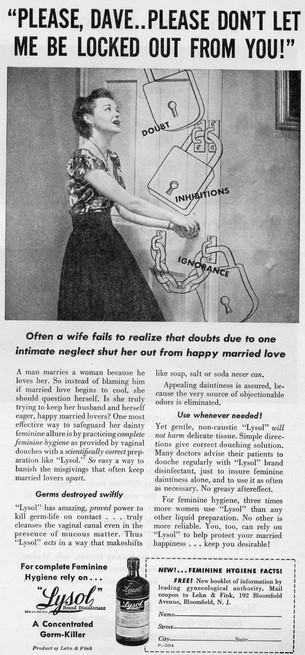Most women have had the unfortunate experience of realizing that they have started their periods at an inconvenient time or place, without proper “backup,” having to rely on (clunky and sporadically available) tampon dispensers in public restrooms. When driving across the country last month, I stopped near Albuquerque at a small gas station and entered the unisex restroom frantically searching for a tampon machine. Instead, I found a large, brightly-colored condom machine fastened prominently on the wall that featured four options: “ribbed for her pleasure” condoms, extra-large condoms, packages of lube, and a “grab bag” of “sexual surprises.” A nearby wall above the toilet seat featured a prominent sign: DO NOT FLUSH FEMININE HYGIENE PRODUCTS DOWN THE TOILET OR IT WILL CLOG OUR SYSTEM. Feeling unusually irked by this duality—the cheery availability of (men’s) safer sex products and the utter disdain for women’s menstrual products—I reflected on the bigger problem of this gendered bathroom dilemma: Women’s bodies—leaky and troublesome—are too often constructed with the context of disease, contamination, and unhygienic fixations. Men, on the other hand, receive props for their “leakages” as humorous, fun, playful, and sexy. (I recently realized how rarely menstruation is treated with humor or fun when I felt an uncommon joy at bleeding into my black and blue skull-and-crossbones reusable Lunapads).
I loathe the term feminine hygiene for a host of reasons. At its most benign, the term gives vague descriptors for what women use to manage their menstrual cycles, giving additional cultural momentum behind the general refusal to deal with nuance and specifics of a menstruating vagina (or vaginas at all, frankly). When stores, advertisements, and signs evoke feminine hygiene, they suggest, linguistically, that the words tampon, pad, or cup seem scary. The phrase feminine hygiene implies “products to keep the unkempt, unruly, unhygienic, dirty, unsanitary, bloody vagina in check,” rather than simply stating the actual terms for what women use. (It also needlessly genders the already-gendered process of menstruation). Why not use a less pejorative phrase like menstrual products? The bizarre throwback to the 1950s represented by the continued use of feminine hygiene has serious trickle down effects on people’s attitudes about menstruation, as Elizabeth Kissling’s 2006 book, Capitalizing the Curse, showed that people still feel palpable anxiety about purchasing menstrual products in the store or discussing menstruation openly. Many people do not even know the term menstrual or menstruation as commonly understood words. I blame feminine hygiene for this.
Second, by framing menstrual products as products devoted to cleanliness and management of otherwise “vile” bodily fluids, feminine hygiene products get placed near products of excrement like diapers and incontinence merchandise in the store. A typical sign will read: “Feminine Hygiene, Diapers, Personal Care” in these aisles of the grocery store. Years ago, a student of mind visited over 25 grocery stores and pharmacies and found that nearly every single store placed tampons and pads directly beside diapers. The use of hygiene here links menstrual blood with feces, urine, and products that infantilize women and their bodies. It also implicitly links the feminine (another bizarre word that is rarely attached commercially to anything besides menstrual products) with women needing to clean their own and others’ messy bodies.
My third concern about feminine hygiene is that we don’t fully understand the history of the (d)evolving phrase. As Andrea Tone found, feminine hygiene once referred to birth control rather than menstrual products. A 1933 advertisement in McCalls for Lysol’s feminine hygiene products read:
The most frequent eternal triangle:
A HUSBAND…A WIFE…and her FEARS
Fewer marriages would flounder around in a maze of misunderstanding and unhappiness if more wives knew and practiced regular marriage hygiene. Without it, some minor physical irregularity plants in a woman’s mind the fear of a major crisis. Let so devastating a fear recur again and again, and the most gracious wife turns into a nerve-ridden, irritable travesty of herself.
 Translation: Use feminine hygiene (birth control) if you want to avoid your wife turning down sex because she’s scared of pregnancy. Over the next twenty years, it later transitioned from a reference to birth control into a reference for female douches (An ad touted: “There are some things a husband just can’t mention to his wife!”) and finally into a phrase about managing menstruation. Why this feminine hygiene phrase has stuck with us so forcefully, and why we insist on vague and unspecific terminology for menstrual products, relates directly to broader discourses of panic around, and ignorance about, women’s reproduction, menstruation, and vaginal health. Just ask Todd Akin.
Translation: Use feminine hygiene (birth control) if you want to avoid your wife turning down sex because she’s scared of pregnancy. Over the next twenty years, it later transitioned from a reference to birth control into a reference for female douches (An ad touted: “There are some things a husband just can’t mention to his wife!”) and finally into a phrase about managing menstruation. Why this feminine hygiene phrase has stuck with us so forcefully, and why we insist on vague and unspecific terminology for menstrual products, relates directly to broader discourses of panic around, and ignorance about, women’s reproduction, menstruation, and vaginal health. Just ask Todd Akin.


